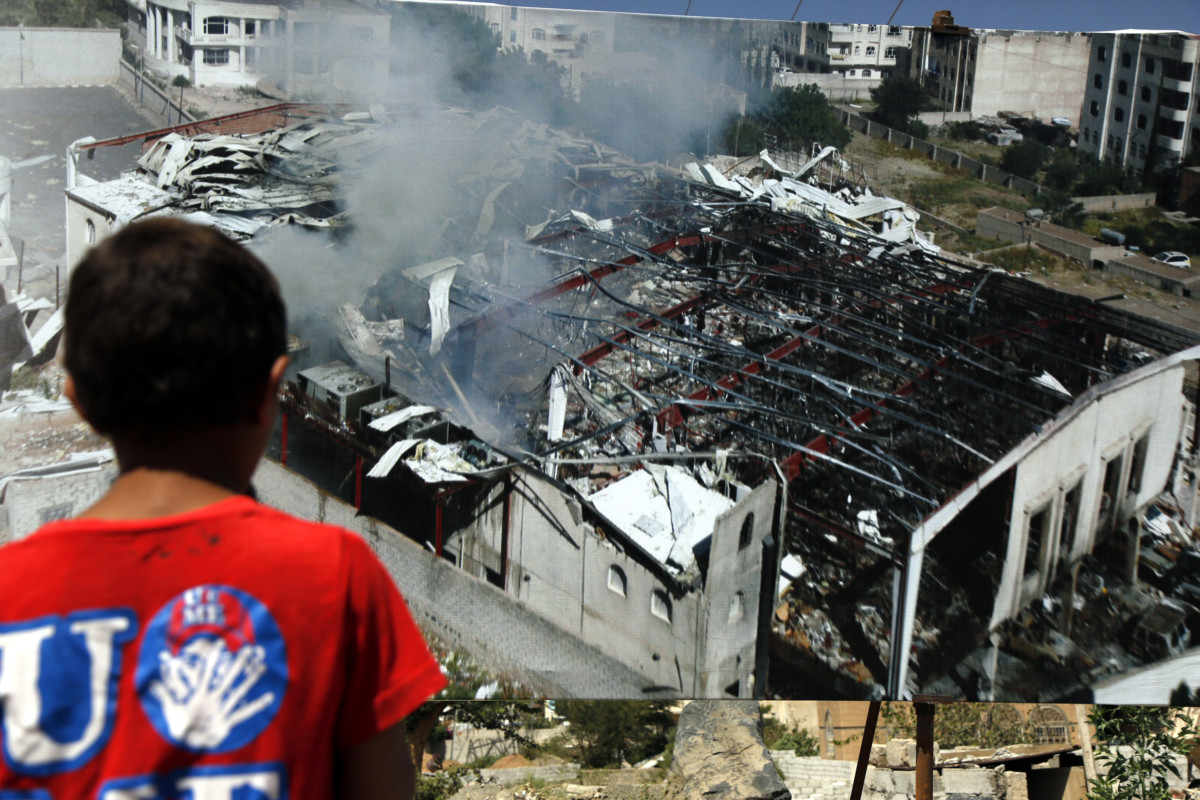Honest, paywall-free news is rare. Please support our boldly independent journalism with a donation of any size.
Weddings. Funerals. A school bus full of children. The Saudi-led coalition continues to bomb civilians in Yemen’s civil war. In fact, according to a recent report from the Armed Conflict Location & Event Data Project, the coalition’s offensive against the port city of Hodeida is largely responsible for a 164 percent increase in civilian deaths in Yemen since June. Thankfully, a group of 24 fed-up House representatives led by Reps. Ro Khanna (D-California) and Adam Smith (D-Washington) are reviving efforts in Congress to end US support for this brutal intervention. Their bipartisan legislation introduced last month, H.Con.Res.138, enjoys a privileged status that should guarantee it a floor vote in the House of Representatives. It deserves unanimous support.
Since March 2015, the US has provided what it calls “intelligence and logistical support” to a coalition of Gulf nations led by Saudi Arabia and the United Arab Emirates that intervened in Yemen’s civil war. While that role sounds innocuous enough, the support has included, for example, mid-air refueling of coalition warplanes that enable the coalition to kill civilians and destroy civilian infrastructure at a much higher rate than would otherwise be possible. This support was also never authorized by Congress. As legal experts argue, it needs to be, in order to adhere to US law.
Over the past three years, this US-backed intervention in Yemen has killed thousands of civilians, destroyed vital civilian infrastructure and pushed the humanitarian situation in the region’s poorest country from grim to apocalyptic. Beyond direct military support, the US has sold the coalition tens of billions of dollars’ worth of advanced weaponry since the start of the war. One such piece of hardware is Raytheon’s GBU-12 Paveway II guided bomb. When a coalition airstrike hit a wedding party in April, local media published photos showing fragments of Raytheon’s “smart” bomb in the rubble. That strike killed at least 33 people, including the bride of the wedding.
Far from anomalous, coalition airstrikes hitting civilian gatherings or infrastructure are reported on a regular basis. On August 9, it was a bus full of school children returning from a field trip. Forty-four children and 10 adults were killed when an airstrike hit the bus as the driver stopped for a drink in a busy marketplace. Astoundingly, the coalition defended the strike — which also employed a US-made bomb — as “legitimate,” before backing down amid international condemnation and calling it a mistake.
As a direct result of the war, 22 million Yemenis depend on humanitarian aid and more than 8 million are on the verge of starvation. According to UN Emergency Relief Coordinator Mark Lowcock, “If conditions do not improve, a further 10 million people will fall into this category [at risk of starvation] by the end of the year.”
While some legislators have taken a consistent stand against US support for the war, Congress as a whole has repeatedly refused to take action. In June of last year, 47 senators supported legislation introduced by Sens. Rand Paul (R-Kentucky) and Chris Murphy (D-Connecticut) that would have blocked a sale of precision-guided munitions (like Raytheon’s GBU-12 bomb) to Saudi Arabia. But 53 senators thought selling more bombs to Saudi Arabia was a good idea.
Last fall, Rep. Ro Khanna invoked the War Powers Act in an effort to force a vote on whether or not to end US support, but Republican leadership managed to strip the measure of its privileged status, preventing it from getting a vote. In March, Sens. Bernie Sanders (I-Vermont), Mike Lee (R-Utah) and Chris Murphy (D-Connecticut) invoked the War Powers Act again and succeeded in getting a procedural vote. But 55 senators thought having Congress actually take a vote on war as the Constitution mandates was a bridge too far.
Following another year of carnage in Yemen, Rep. Ro Khanna and a growing coalition in Congress are giving the war powers approach another go, this time with the support of key Democratic leaders who opposed the effort last year.
Congress should have stopped the US role in the war when the Obama administration first offered military support without congressional approval. It should have ended the US role when reports of US-made bombs killing civilians in Yemen started surfacing in 2015. But with millions of Yemenis facing starvation and indiscriminate airstrikes, better late than never is the right idea. Every member of Congress should support this renewed effort to end our complicity now. Conscientious Americans can call Congress and demand that they do.
Speaking against the authoritarian crackdown
In the midst of a nationwide attack on civil liberties, Truthout urgently needs your help.
Journalism is a critical tool in the fight against Trump and his extremist agenda. The right wing knows this — that’s why they’ve taken over many legacy media publications.
But we won’t let truth be replaced by propaganda. As the Trump administration works to silence dissent, please support nonprofit independent journalism. Truthout is almost entirely funded by individual giving, so a one-time or monthly donation goes a long way. Click below to sustain our work.
